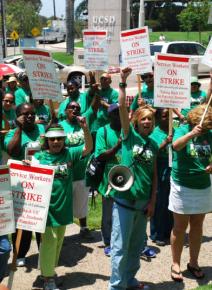UC strikers show their strength
SocialistWorker.org contributors report from the picket lines on the walkout by 8,500 service workers in the University of California system.
SPIRITS WERE high at the midpoint of a strike at 10 University of California (UC) campuses and five hospitals, with more than 200 service workers represented by AFSCME Local 3299 gathering July 16 in front of the University of California (UC) president's office to demand fair contracts.
Picket line rallies were also held up and down the state, as the service workers--some 8,500 groundskeepers, custodians, cafeteria workers, medical technicians and others are on strike--turned out. The only members of Local 3299 to remain on the job were those directly involved in patient care, as instructed by the union.
In Los Angeles, Reggie Miles, a picket captain, explained why workers are so determined to fight. "People in my unit started taking home cans and bottles to recycle so that they could have enough money for gas," Miles said. "People call in sick from work all the time from not having enough money to get gas for their cars or get the bus. The administration put out a memo saying that if you took cans and bottles from the garbage, you're stealing from the university, and you'll be fired.

"UC says that they're number one in research, and yet they don't realize that comes from the workers. I've worked in the research department doing support and upkeep for 12 years, and have never received a department raise. If it weren't for COLA (cost-of-living adjustments), I would never have received a raise at all. There hasn't been a department raise since 1979."
Students walked the picket lines to show their support. "These people have something to complain about," said Jose Aldarracin, an immigrant from Peru and biology undergrad at UC-Berkeley. "It's a good thing – this type of thing should be heard."
LAST WEEK, the University of California sought and won a judge's restraining order against Local 3299, claiming that the strike was illegal, and that the union was bargaining in bad faith. AFSCME is challenging the ruling in court.
But despite the judge's action--and threats by the University of California that workers face disciplinary actions for continuing their strike--union officials report that between 70 and 80 percent of the employees are honoring picket lines.
Paul Freiman, an anesthesiology tech at UC-San Diego Medical Center, said that management had threatened workers in his department with dismissal if they supported the strike. He was on the picket line, he said, because "in 17 years here, I have gotten $5 in raises, and in the last three years, I haven't gotten anything in raises. I see all my coworkers, all the service workers, most of them have to work two jobs."
UC service workers wages are so low--as little as $10 per hour, according to the local--that 96 percent qualify for public assistance, like food stamps, childcare and public housing subsidies. Their pay is 25 percent lower than their counterparts in the California State university system and community colleges, according to union researchers.
As food, gas and housing prices skyrocket, the UC administration's "final offer" included no guaranteed wage increase for service workers, a minimum wage of just $11.50 an hour, and no guarantee on benefits, according to the union.
Angie Mendoza, a senior custodian at UC-San Diego Hospital, said she "feels great to do this, to get a contract, because they don't want to give us nothing...I just want to be treated fair. I've been here 19 years, and I only make $15 an hour, and we have other workers who only make $10 an hour."
To add insult to injury, the university also wants service workers to shell out more cash for parking (nearly doubling the fee) and for health care costs.
"Every six months, the parking permit goes up," said Faith Douangmala, a single mother of six who has been a custodial worker for five years at UC-Berkeley. "It takes us three hours to earn a month's parking. That could pay for diapers or formula or food, or even clothing for our children. At the wages we make, we can't afford to take our kids on a vacation or anywhere special."
Perhaps the most outrageous fact is that while the university seems unable to find money for raises for service workers, the new UC president, Mark Yudof, has been hired at a whopping $828,000 a year salary, nearly twice as high as his predecessor and more than any other university president. Yudof's lavish pay comes on the heels of two years of scandals over administrative perks at UC and malfeasance in the use of public money.
"The university has plenty of money," said Tom Gallo, a campus janitor for 22 years at UC-Berkeley. "But everything the state has given us, they hoard and use for administrators' salaries, retreats and lavish vacations for the big executives."
The fact that university officials claim that there's no money for wages but have found money for themselves is one of the main issues that is driving the anger of workers on the picket lines. As one striking worker at UC-Berkeley said, "Who do they think they're kidding? They always get theirs. It's time we get ours."


